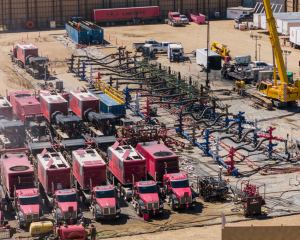With a key investor headed to the U.S. Department of Energy, advanced geothermal energy developer Fervo Energy is hitting financial jackpots. Houston-based Fervo is turning natural gas fracking technology to the task of expanding access to hot rocks to make steam and electricity.
The company last month (Dec. 19) announced it had nailed down $255 million in new investments for its enhanced geothermal technology: $135 million in equity from Capricorn investment group’s “Technology Impact Funds and a $120 million loan from energy investor Mercuria.
Fervo CEO and founder Tim Latimer, a veteran of the conventional oil and gas business, said, “The demand for 24/7 carbon-free energy is at an all-time high, and Fervo is one of the only companies building large projects that will come online before the end of the decade. Investors recognize that Fervo’s ability to get to scale quickly is vital in an evolving market that is seeing unprecedented energy demand from AI and other sources.”
Fervo has a project underway on private and federal land in Utah using directional drilling and hydraulic fracturing that could ultimately produce 2 GW of baseload electric capacity. The U.S. Interior Department’s Bureau of Land Management in October described the Cape Geothermal Project as including “the development of an estimated 320 geothermal production and injection wells, up to 20 modular geothermal power plants, a power distribution system, an electrical switchyard, a general tie-in transmission line, geothermal fluid pipeline gathering system, associated access roads, and ancillary facilities such as pumping stations and required tie-in upgrades.”
In July 2023, Fervo announced it had run a successful 30-day test “at its full-scale commercial pilot, Project Red, in northern Nevada.” The test showed “a flowrate of 63 liters per second at high temperature that enables 3.5 MW of electric production, setting new records for both flow and power output from an enhanced geothermal system.”
That success last February saw Oklahoma-based oil and gas independent Devon Energy leading a $224 million funding consortium to invest in Fervo as it moves toward commercial operation. The Devon funding group includes Japan’s Mitsubishi Heavy Industries. At the same time, the Department of Energy awarded Fervo $25 million.
The incoming Trump administration is likely to continue to smile on Fervo. Trump’s nominee to head DOE, Chris Wright, is the founder and CEO of successful Denver-based Liberty Energy (NYSE:LBRT), which provides equipment used in fracking. In the second quarter of 2022, the company invested $10 million. In a press release, Wright said, “We chose this investment opportunity because of our belief in the concept viability, the quality of Fervo’s team, and the size of the potential resource already captured. We will work in collaboration with Fervo to solve similar challenges that we have seen with the shale revolution. The investment in Fervo is a natural fit for Liberty in the rapidly evolving geothermal market.”
Wright added, “Unconventional geothermal applications offer a potential pragmatic solution for a reliable source of low-carbon electricity, and we’re excited to be a part of the journey.”
Wright is expected to easily win Senate confirmation as energy secretary. Unlike many previous occupants of the office, he has solid energy experience and a low-key demeanor. Wright, 59, is a native Coloradan. He has a B.S. and M.S. in electrical engineering from MIT. He has no political experience. Environmental activists claim he is a “climate denier,” although that is not the case. He acknowledges that the globe is warming, but does not regard that as an existential crisis, rather as a problem that can be managed.
Some potential opponents have noted with alarm that in 2019, Wright drank fracking fluid to prove it is not dangerous. What they either don’t know or ignore is that Democratic Colorado Senator John Hickenlooper when he was governor also drank fracking fluid to prove it is benign.

When Wright was nominated to DOE, POWER magazine reported that Liberty Energy “is considered a leader in mitigating the impacts of fracking in oil and gas extraction. The company introduced noise-dampening, foam-layered compartments known as Quiet Fleet several years ago to lessen the noise of drilling operations. Liberty also has made a business out of powering fracking fleets with lower-emissions fuels, including hydrogen.
“The company over the past couple of years has successfully used electricity-powered fracking fleets that it designed. The so-called digifrac’ electric units are replacing fracking engines powered by diesel fuel or natural gas. The electric versions help reduce air pollution and greenhouse gas emissions generated at a fracking site.”












